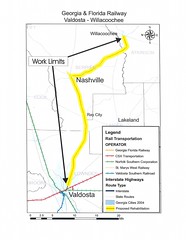 from Valdosta to Moody AFB
and on to Ray City and Nashville in Berrien County,
and Willacoochee in Atkinson County.
This proposal is to aid freight, but with this upgrade to the track,
the same track would be even more readily usable for passenger rail.
That same track was used for passenger travel up into the 1950s.
My mother used to catch the train at Barretts (just north of Moody) to go visit her relatives in Pearson (a bit east of Willacoochee).
from Valdosta to Moody AFB
and on to Ray City and Nashville in Berrien County,
and Willacoochee in Atkinson County.
This proposal is to aid freight, but with this upgrade to the track,
the same track would be even more readily usable for passenger rail.
That same track was used for passenger travel up into the 1950s.
My mother used to catch the train at Barretts (just north of Moody) to go visit her relatives in Pearson (a bit east of Willacoochee).It’s true the project sheet talks about “potential customers in the region”:
This project will provide for more efficient train operations along the rail corridor to accommodate the increase rail traffic serving the existing and potential customers in the region.However, rail promotes development in existing population centers and at stations, unlike all along automobile roadways.
This project is also another example of how the economic area of Moody AFB includes Continue reading






